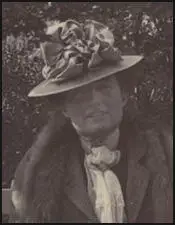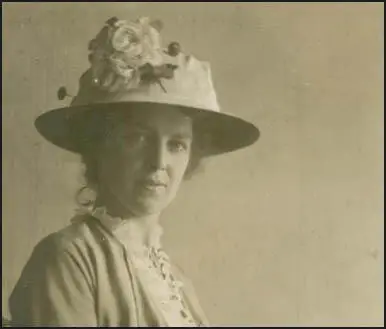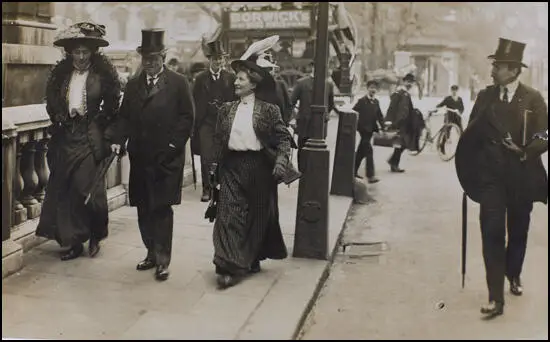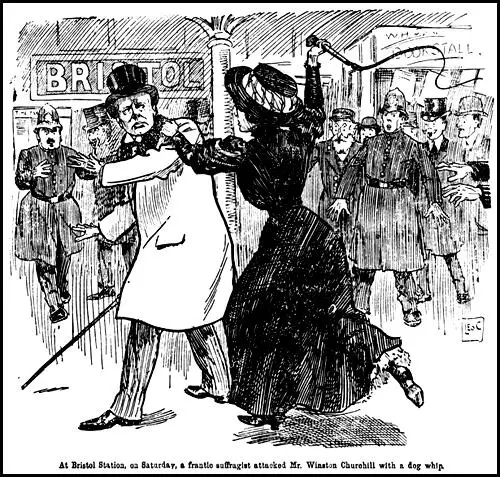Catherine Corbett

Catherine Isabel Ida Vans Agnew, the fourth of six children born to Rosa Coppard Wilson and George Vans Agnew, was born in Ootacamund, a town in the Madras Province of India (now the Indian state of Tamil Nadu) on 12th May 1869. Other children from the union included Robert (1865-1931), Patrick (1867-1929), Frank (1868-1955), Ernest (1871-1957) and Violet (1873-1929). Her father was an official in the Indian Civil Service. (1)
According to an article in the Votes for Women that Catherine... "comes of an ancient family who have owned the lands of Barnbarroch in unbroken descent from Johannes de Vallibus or Vans, who obtained them in 1384." (2)
George and Rosa Vans Agnew returned to Britain around 1872. The 1881 Census records George Vans Agnew and his family at Percy Lodge, Kensington, London, Middlesex. At this time the family employed the following servants: Annie Jones (cook), Emily Flint (ladies maid), Jessie Wood (parlour maid) and Frances M. Cordery (housemaid). (3)
Marriage and the Corbett Family
On 22nd October 1895, at St Paul's Church, Wilton Place, Knightsbridge, Catherine Isabel Ida Vans Agnew married Frank Edmund Corbett, aged 32. His brother Charles Henry Corbett was a barrister and solicitor, who supported women's rights and a member of the Men's League For Women's Suffrage. The Corbett's were a wealthy family and when Frank's father, Charles Joseph Corbett, died on 24th March 1882, he left a personal estate worth £102,981. (4)
Her sister-in-law, Marie Corbett, was also an active feminist. After the passing of the Municipal Franchise Act Marie became a member of the Uckfield Board of Guardians. Later she was the first woman to serve on the Uckfield District Council. Marie also took an active role in national politics and was one of the three women who founded the Liberal Women's Suffrage Society. When attempts to persuade the Liberal Government to introduce measures to give women the vote ended in failure, Marie, and her daughters Margery Corbett Ashby (1882), and Cicely Corbett Fisher (1885) became active in the National Union of Women Suffrage Societies. (5)

Charles Corbett was the Liberal Party candidate in East Grinstead. In the 1906 General Election took place the following month. The Liberal Party won 397 seats (48.9%) compared to the Conservative Party's 156 seats (43.4%). The Labour Party, led by Keir Hardie did well, increasing their seats from 2 to 29. In the landslide victory Arthur Balfour lost his seat as did most of his cabinet ministers. Corbett won the seat by 262 votes. Margot Asquith wrote: "When the final figures of the Elections were published everyone was stunned, and it certainly looks as if it were the end of the great Tory Party as we have known it." (6)
Unlike the Liberal leadership, Charles Corbett strongly supported votes for women and helped form the East Grinstead branch of the Men's League for Women's Suffrage. Disappointed with the poor record of the Liberal Party with respect to women's suffrage, Marie left the Women's Liberal Federation and with her two daughters helped form the Liberal Suffrage Group. In 1907 Margery Corbett decided to become a full-time campaigner for women's rights and became secretary of the National Union of Women Suffrage Societies (NUWSS). (7)
Women's Social & Political Union
Catherine Corbett became disillusioned with the lack of success of the NUWSS and joined the more militant Women's Social & Political Union (WSPU) led by Emmeline Pankhurst. (8) The main objective was to gain, not universal suffrage, the vote for all women and men over a certain age, but votes for women, "on the same basis as men." This meant winning the vote not for all women but for only the small stratum of women who could meet the property qualification. As one critic suggested, it was "not votes for women", but “votes for ladies.” As an early member of the WSPU, Dora Montefiore, pointed out: "The work of the Women’s Social and Political Union was begun by Mrs. Pankhurst in Manchester, and by a group of women in London who had revolted against the inertia and conventionalism which seemed to have fastened upon... the NUWSS." (9)
Corbett took part in several demonstrations and on 24th February 1909 she was arrested and served four weeks in prison for obstruction. (10) During her time in prison she went on hunger-strike. (11) Corbett, along with Constance Lytton, Una Dugdale, Mary Allen, Sarah Carwin and Helen Kirkpatrick Watts were released from prison on 24th March they were released from prison. They were greeted by Christabel Pankhurst, Annie Kenney, Mabel Tuke, Rachel Barrett, Maud Joachim, Vera Holme and Muriel Matters. "By 7.30 the prison authorities were able to witness the now familiar sight of Suffragettes, wearing their colours, and groups of friends and interested onlookers rapidly gathering in the thoroughfares around the prison gate. The scene was further enlivened by the arrival of the seven draped and decorated carriages and pairs for the released prisoners appeared, and the horsewomen appointed to lead the cavalcade." (12)
On her release she joined the team of suffragettes led by Jessie Kenney and including Vera Wentworth, Mary Phillips and Elsie Howey, decided to target the prime minister, Herbert Asquith. On 28th April, 1909, Olive Fargus, who was twenty-nine, solicitor's daughter and Catherine Corbett, according to the Daily Mirror, a "tall dark and handsome lady" accosted Asquith as he left a meeting in Whitehall. Corbett told a journalist that Asquith was a "little surprised and reserved but he showed no resentment". However, he did add: "I think you are very silly." (13)

On 29th June, 1909, Catherine Corbett, was chosen along with Emmeline Pankhurst, Emmeline Pethick-Lawrence, Edith Mansell Moullin, Eveline Haverfield, Maud Joachim and Dorinda Neligan, to be a member of a deputation to the House of Commons. "In anticipation of a general disturbance nearly 3,000 police had been drafted from all parts of London with Rochester Row and Cannon Row stations as early as five o'clock in the afternoon... Inspector Scantlebury handed her (Mrs Pankhurst) a message from the Premier's private secretary, stating that it was not possible for Mr Asquith to see them, as he had already expressed the opinion upon the subject.... A long conversation ensued, and then a scrimmage, during which Inspector Jarvis was rather roughly handled. Mrs Pankhurst it is alleged, striking him violently on the face with her hand. Immediately the police closed round the women, who were taken into custody, struggling violently." (14)
Winston Churchill
As a senior member of the Liberal Party government Winston Churchill became a target for the Women's Social & Political Union. Churchill had been a long-term opponent of votes for women. As a young man he argued: "I shall unswervingly oppose this ridiculous movement (to give women the vote)... Once you give votes to the vast numbers of women who form the majority of the community, all power passes to their hands." His wife, Clementine Churchill, was a supporter of votes for women and after marriage he did become more sympathetic but was not convinced that women needed the vote. When a reference was made at a dinner party to the action of certain suffragettes in chaining themselves to railings and swearing to stay there until they got the vote, Churchill's reply was: "I might as well chain myself to St Thomas's Hospital and say I would not move till I had had a baby." However, it was the policy of the Liberal Party to give women the vote and so he could not express these opinions in public. (15)
In public he supported the principle of women's suffrage as it was party policy. In private he was totally opposed as he thought it would be to the disadvantage of the Liberal Party. Should women be given the vote on the same limited basis as men (which would favour the Conservative Party) or should there be a massive extension of the franchise to enable all adults to vote (which would favour the Labour Party). Churchill warned the Cabinet that if the government introduced plans for women's suffrage he would probably have to resign. (16)
Catherine Corbett joined with Adela Pankhurst, Maud Joachim and Helen Archdale in an effort to disrupt Churchill's public meeting at Kinnaird Hall in Dundee. Pankhurst and two men, Owen Clark and William Carr, hid themselves in an attic and threw stones, bricks and slates at the roof-light of the hall, calling out "votes for women". Meanwhile, Corbett, Joachim and Archdale, led a group of supporters that charged the barricades thrown up around the hall. (17)
The Dundee Courier reported: "Their sudden appearance (Catherine Corbett, Maud Joachim and Helen Archdale) had a magical effect on the mob. Surging round the women, they threw themselves against the solid wall of police. The officers fought valiantly, but were utterly helpless to stem the great human tide… Meanwhile the crowd time and again charged the police, and succeeded in reaching the barricades… The crowd in Reform Street were now incensed to fever pitch, and several ugly rushes were made to force a way to Bank Street." (18)
The women were arrested but Corbett later paid tribute to the courage of the Dundonians who had rioted for three hours: "they would not stop until they got the barricades down, they were glorious." (19) Each woman made a lengthy speech in court and was sentenced to ten days in prison. They all went on hunger-strike. Churchill disagreed and told the local newspaper that the women were "a band of silly, neurotic women". (20)
Catherine Corbett later spoke about her time in prison: "I was removed to a cell in which there was not furniture, but a log fixed on the floor and a shell fixed into the wall. Afterwards I was taken into a ward and dressed by force in prison clothes. In contrast to Holloway Prison, the baths were spotlessly clean. On my return to my cell I started a hunger strike, and took no water until 10.30 on Friday, when I was suffering a great pain and becoming so ill that I was visited every two hours. I took a little water, which brought me great relief. The nights were terrible, and I could not sleep. Every persuasion was used to make me take food, but I refused always." (21)

In an act of revenge, on 13th November 1909, Theresa Garnett accosted Winston Churchill with a horse whip. She shouted "take that you brute", however, she later admitted she missed him but did "knocked his hat about". She was arrested for assault but was found guilty of disturbing the peace and was sentenced to a month's imprisonment in Horfield Prison. (22) Her friend, Mary Blathwayt, wrote in her diary on 15th November: "Miss Garnett got one month for whipping Mr. Churchill across the face and not hurting him. I bought fruit and sent it to the prisoners before they were taken away." (23)
Retirement from Politics
At the time of the 1911 Census Frank Corbett, a 48 year-old invalid living on "private means", was residing at The Bungalow, Falmouth, Cornwall, with Laura Goggin, a hospital nurse, and two female servants. The census enumerator noted on the census form that the two unnamed domestic servants, a cook and a general servant, "refused all information concerning themselves", which suggests that they were protesting on behalf of the women's suffrage movement. (24)
At this time Catherine Corbett appears to have ended her involvement in the Women's Social & Political Union. It is not known whether it was of because of poor health or disapproval of the WSPU arson campaign. Some members of the WSPU, including Adela Pankhurst became concerned about the increase in the violence as a strategy. She later told fellow member, Helen Fraser: "I knew all too well that after 1910 we were rapidly losing ground. I even tried to tell Christabel this was the case, but unfortunately she took it amiss." After arguing with Emmeline Pankhurst about this issue she left the WSPU in October 1911. Sylvia Pankhurst was also critical of this new militancy. (25)
Frank Edmund Corbett, died at the age of 49 on 7th August 1912 at The Bungalow, Falmouth, Cornwall, leaving an estate valued at £56,205. (26) At the time of the 1921 Census, Catherine Isabel Ida Corbett was residing at 17 Gayfere Street, Pimlico, London, SW1. On the census return, Mrs Catherine Isabel Ida Corbett is described as a 52 year old widow and gives her personal occupation as "A Student of Christian Science". (27)
The 1939 General Register records Mrs Catherine Vans Corbett as a patient at Fremington House Private Mental Nursing Home, Barnstaple, Devon. Under the heading of "Personal Occupation" is the word "incapacitated". (28)
Catherine Isabel Ida Vans Corbett, of Bramley House, Bramley, Surrey, died on 8th May 1950, four days short of her 81st birthday. Catherine Corbett's effects were valued at £798.
Primary Sources
(1) Votes for Women (26th March 1909)
The following prisoners were released from Holloway on Wednesday morning: Lady Constance Lytton, Miss Daisy Solomon, Mrs Frank Corbett, Miss Una Dugdale, Mrs Madeline Petre… Miss Mary Allen… Miss Caroline Townsend, Mrs Tyson, Miss Tyson, Miss Sarah Carwin… and Mrs Kirkpatrick Watts.
By 7.30 the prison authorities were able to witness the now familiar sight of Suffragettes, wearing their colours, and groups of friends and interested onlookers rapidly gathering in the thoroughfares around the prison gate. The scene was further enlivened by the arrival of the seven draped and decorated carriages and pairs for the released prisoners appeared, and the horsewomen appointed to lead the cavalcade. Meanwhile Bryer's well-known band was playing lively airs.
(2) The Daily Mirror (30th June 1909)
Thousands of people gathered in Parliament Square and thronged the approaches to the Houses of Parliament long before the expected suffragette deputation to the House of Commons left Caxton Hall last night.
In anticipation of a general disturbance nearly 3,000 police had been drafted from all parts of London with Rochester Row and Cannon Row stations as early as five o'clock in the afternoon.
The meeting at Caxton Hall which prefaced the raid began at 7.30. The hall was packed with suffragettes, wearing scarves and ribbons and sashes of purple, white, and green, the colours of the Women's Social and Political Union.
Mrs Pethick Lawrence was in the chair and Mrs Pankhurst and the other members of the chosen deputation – limited to eight women – supported her on the platform. The deputation that ultimately set out consisted of: Mrs Pankhurst, Mrs Mansell, Mrs Saul Soloman, Miss Catherine Margenson, Mrs Haverfield, Dorinda Neligan, Miss Maude Joachim and Mrs Frank Corbett.
Of the above Mrs Pankhurst is of course, one of the original leaders of the militant suffragettes. Mrs Mansell, the wife of Colonel Mansell, is a granddaughter of the late Lord Wimborne and the first cousin of Mr. Ivor Guest, M. P. one of the founders of the Anti-Suffrage League.
Mrs Saul Solomon is the widow of a former Premier of Cape Colony, Miss Margesson is a daughter of Lady Isabel Margeson, Miss Joachim, a niece of the famous violinist, and the Hon Mrs Haverfield, a daughter of the third Lord Abinger.
Mrs Corbett is a sister-in-law of Mr C. H. Corbett, M.P., Miss Neligan is seventy-nine years of age…
Inspector Scantlebury handed her (Mrs Pankhurst) a message from the Premier's private secretary, stating that it was not possible for Mr Asquith to see them, as he had already expressed the opinion upon the subject.
"We can't accept that!" exclaimed Mrs Pankhurst, and immediately afterwards endeavoured to push the two inspectors away. "If we can't get anything else we must assert our rights."
A long conversation ensued, and then a scrimmage, during which Inspector Jarvis was rather roughly handled. Mrs Pankhurst it is alleged, striking him violently on the face with her hand.
Immediately the police closed round the women, who were taken into custody, struggling violently.
(3) Votes for Women (2nd July 1909)
Mrs Catherine Isabel Ida Corbett comes of an ancient family who have owned the lands of Barnbarroch in unbroken descent from Johannes de Vallibus or Vans, who obtained them in 1384. She is the daughter of the late Mr. John Vans Agnew, who served twenty-five years in the Indian Civil Service, and the granddaughter of Colonel P. A. Vans Agnew, C. B. of Barnbarroch and Shenchane. Her husband, Mr Frank Corbett, is part-owner of Woodgate, Danehill, Sussex, and is Commodore of the Royal Norfolk and Suffolk Yacht Club. Her brother-in-law is Mr. C. H. Corbett M.P. for East Grinstead Division of Sussex, and she has already been imprisoned for taking part in the February deputation. Mrs Corbett was drawn into the movement by witnessing the dignity and courage of Mrs Pankhurst on the occasion of her arrest in March, 1908. She is extremely proud of the honour and privilege of being a member of the WSPU.
(4) Votes for Women (3rd September 1909)
Mrs Frank Corbett has addressed a large open-air meeting in the Corn Exchange at Stirling, where she spoke for over an hour and answered questions.
(5) The Dundee Courier (18th October 1909)
Their sudden appearance (Catherine Corbett, Maud Joachim and Helen Archdale) had a magical effect on the mob. Surging round the women, they threw themselves against the solid wall of police. The officers fought valiantly, but were utterly helpless to stem the great human tide… Meanwhile the crowd time and again charged the police, and succeeded in reaching the barricades… The crowd in Reform Street were now incensed to fever pitch, and several ugly rushes were made to force a way to Bank Street.
(6) Votes for Women (29th October 1909)
From the accounts which follow it will be seen that more and more is the sympathy of the British public on the side of the women in their protests against Cabinets Ministers. At Dundee especially the splendid section of the crowds, among home, says one of the women, there was hardly an enemy, would have led to serious rioting but for the action of the police is taking the women under their charge…
An account of the great Dundee protest last week shows that Miss Joachim, Mrs Archdale, and Mrs Corbett were arrested, not for any act on their part, but because the police found the crowd so intensely sympathetic to the Suffragettes that they feared a riot. This is corroborated by the local papers…
Mrs Corbett, Miss Joachim, and Mrs Archdale led the "rushes" waving the colours and shouting "Votes for Women! Down with the barricades! Rush the barricades! Follow me, man!" They all came, and there was a furious melee of crowd, police, and mounted police.
(7) Catherine Corbett, Votes for Women (29th October 1909)
They rioted for about three hours and would not stop till they had got the three barricades down; they were glorious… How I love my dear country and her independence… I felt and knew Scotland would not tarnish her honour…
I was removed to a cell in which there was not furniture, but a log fixed on the floor and a shell fixed into the wall. Afterwards I was taken into a ward and dressed by force in prison clothes. In contrast to Holloway Prison, the baths were spotlessly clean. On my return to my cell I started a hunger strike, and took no water until 10.30 on Friday, when I was suffering a great pain and becoming so ill that I was visited every two hours. I took a little water, which brought me great relief. The nights were terrible, and I could not sleep. Every persuasion was used to make me take food, but I refused always. I was visited by ten members of the Visiting Committee – all men. Two were polite and sympathetic, one most insolent. There were four others whom I requested to remove their hats, which they did.
They asked me if I had any complaints, and on my speaking of the intense cold the cells were afterwards heated.
The utmost kindness was shown to me, and I think the Scottish prison system is at least a century ahead of the English.
Huge crowds came every night and roared and cheered outside the gates at nine o'clock. There was never a moment up to 3 a.m. where there were not people standing inquiring at the prison gates. The police now are rather ashamed.
(8) Votes for Women (22nd July 1910)
Mrs Catherine Corbett comes of an old family, tracing her ancestry to 1384. She is the sister-in-law of Mr. C. H. Corbett, ex-member for East Grinstead. She was imprisoned in February of last year, and again took part in the June deputation. She was also arrested for a protest at Newcastle but released after carrying out the hunger strike for over four days.

